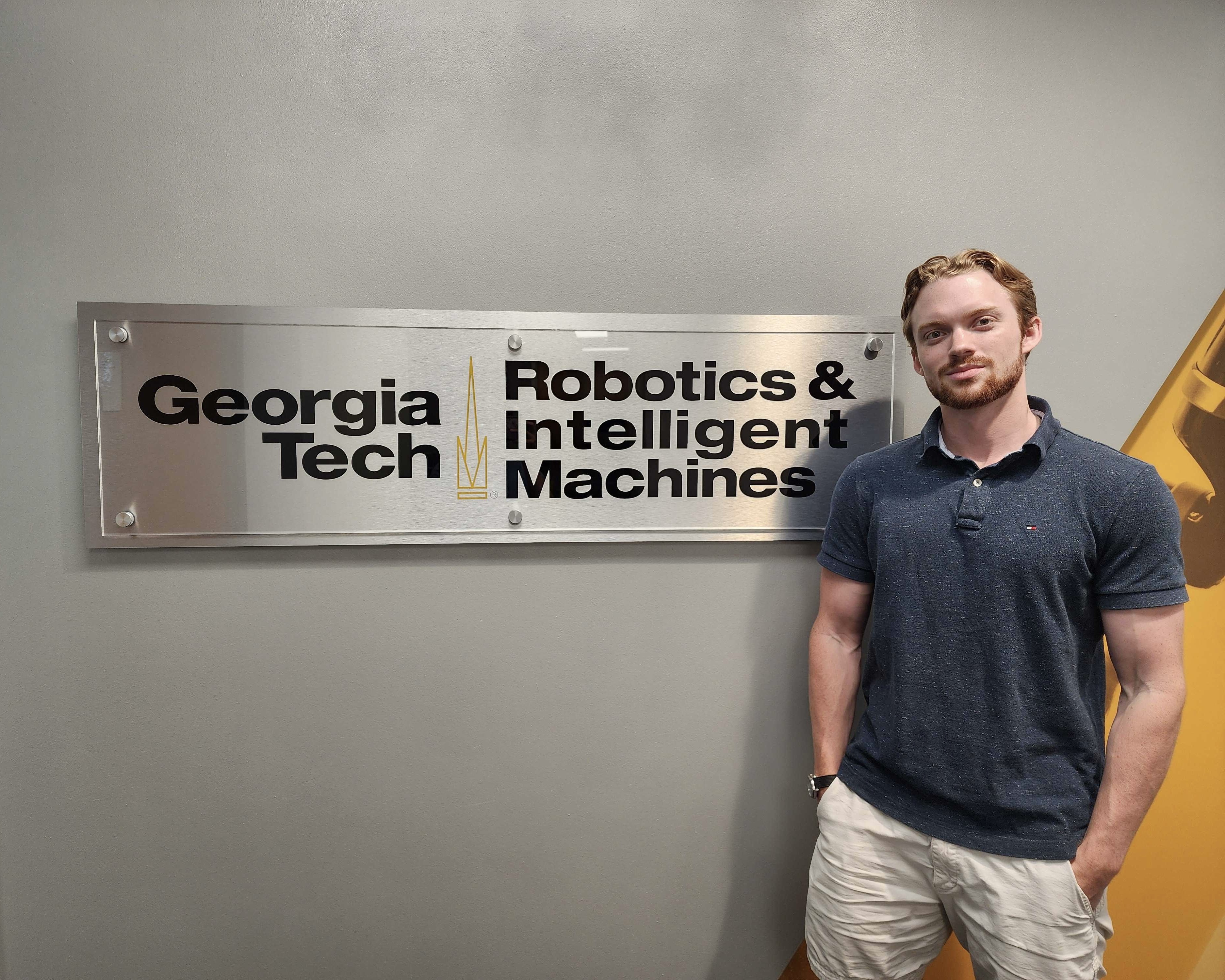From Richter Scholar to PhD student: Jack Curtis ’23's journey into robotics research

Jack Curtis ’23 began his research career as an 18-year-old Richter Scholar the summer after his first year at Lake Forest College and is now a PhD student in the electrical and computer engineering program at the Georgia Institute of Technology studying systems and controls.
As a physics major and math minor at the College, his journey into the world of engineering has been smooth—thanks to the foundational knowledge of his undergraduate classes—but not without its challenges. Curtis walks us through his journey from a Richter Scholar to PhD student and answers questions about his program, passions, and future plans.
 What research experiences did you have at Lake Forest College?
What research experiences did you have at Lake Forest College?
I did research each of the three summers that I was at the College. I was a Richter Scholar the summer after my first year, and I worked with the art department and David Sanchez Burr. I designed 3D environments and modeled objects to be viewed in a virtual reality exhibit. After that, thinking that I wanted to go to grad school for physics after college, I did research with Arthur Bousquet in the math department the summer after my sophomore year. I researched parallel computing, which is being able to solve differential equations on multiple processors.
Then I realized I wanted to study engineering after graduation, and I was trying to figure out how I could make that happen since I wouldn’t have an engineering degree. I worked with the physics department the summer after my junior year and studied industrial automation motors, which are factory-grade motors that had been donated, and my task was to understand how to control them. I fixed some machines and got to learn more about electronic research. Senior year, I worked on a final project where I designed a drone and made a magazine publication about it.
Now you’re pursuing your PhD in electrical and computer engineering at the Georgia Institute of Technology. Why did you choose that school and program?
I didn’t originally apply to Georgia Tech; I had committed to the University of Florida, and two weeks before I was supposed to move there my advisor had a meeting with me and the rest of my lab and told us he received an offer for his dream job at Georgia Tech. So, he was moving the lab and said we could come with if we wanted to, and I did. I was going to work in mechanical and aerospace engineering at the University of Florida, but now I’m in electrical and computer engineering. I do pretty much the same thing but in a different subgroup of study.
What is the focus of your PhD research?
The focus of my lab is to design algorithms that allow teams of agents to work together in a decentralized manner, so no single agent is in charge. This allows for the team to be more adaptable, democratized, and universal to all sorts of problems. The term “agents” could mean teams of drones, satellites, autonomous cars, or houses connected on a smart grid. The algorithms I work on are also asynchronous, allowing the system to be unaffected by slowdown from straggling agents, such as in underwater or space networks where communication delay is long or unpredictable.
What made you want to pursue a PhD?
I wanted to pivot into engineering to work on more applied applications of math, specifically in robotics where I can watch math come alive. I also wanted to be able to develop new knowledge through research.
How did Lake Forest College prepare you for that pivot?
The higher-level math classes that focused on proofs have been very important here because a lot of my PhD work will involve proofs. Some of the classes I’ve had so far are based on the foundations I learned at Lake Forest—the math bones that help build other things.
 What makes you passionate about what you study?
What makes you passionate about what you study?
To me, what I study is an interesting problem to solve, and I love how theoretical it is and how it can be applied to so many different things. That's what I think is exciting: this idea of enabling teams to work together. I like the possibilities of it.
What challenges have you encountered?
I heard that impostor syndrome is a big thing when you start your PhD. As someone with a non-engineering degree, I was feeling that. I took a high-level graduate machine learning class last semester, having not taken any computer science classes at Lake Forest. That one rocked me for sure. I would say some of the classes are harder than I thought they would be, but at the same time, that's not necessarily true. I knew it was going to be hard. It's just one thing to be in it versus thinking about it in the future.
How have you overcome imposter syndrome?
I have a great lab, and I chose it because of the culture they provided. They're very friendly and down-to-earth, which wasn't a common theme among other PhD labs I toured. I've talked to my lab and others a lot about imposter syndrome. The more you talk to people and share your experiences, the more you realize that it’s very common. I realized everyone feels some degree of the same things, and that’s helped a lot.
What kind of work do you hope to do after finishing your PhD?
This field is changing so quickly. I think in five years it’ll be a whole new game. My long-term goal is to get really skilled in some area of AI research and then get more involved in the leadership side of the AI industry, eventually moving out of research. I’m also interested in working on the AI alignment problem, AI governance, or robotics ethics.

